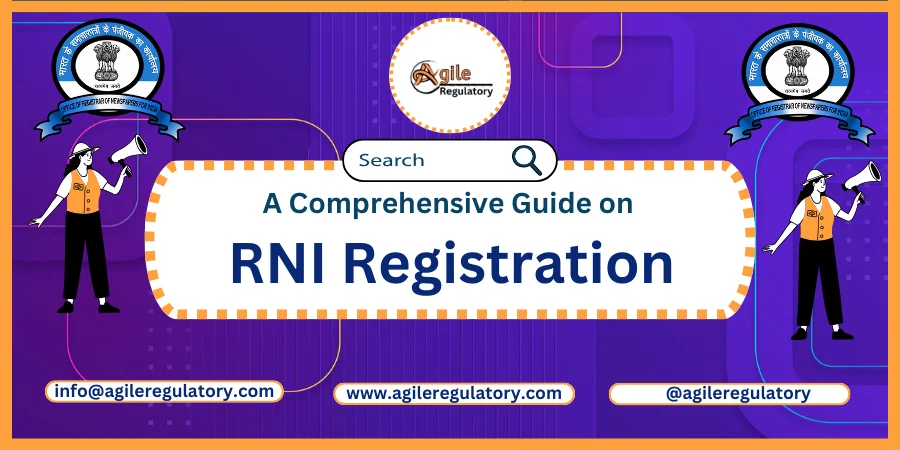
Get Instant Solution By an Expert Advisor
(4.8)


The Indian newspaper and publishing industries are heavily regulated by the Registrar of Newspapers for India (RNI). Newspapers and magazines published in the nation are required to register with the RNI. It acts as a tool to ensure responsibility, authenticity, and transparency in the media and newspaper industry. In this blog we will discuss a thorough explanation of the RNI Registration process, documentation, benefits, and applicability in India, outlining the significance, requirements, and step-by-step procedure.
RNI Registration holds major importance for newspaper agencies, journals, and periodicals in India for several reasons:
As per the Press and Registration of Books Act, of 1867, every newspaper published in India must be registered with the RNI department. Failure to comply with such rules can result in penalties or legal actions or they have to close the business.
Registration with RNI improves the credibility and trustworthiness of a newspaper or periodical. It signifies adherence to legal and ethical standards.
RNI maintains a comprehensive database of newspapers and periodicals, which benefits in collecting accurate circulation and readership data. This information is vital for advertisers and government agencies.
RNI registration provides copyright protection to the published content, preventing unauthorized reproduction.
RNI (Registrar of Newspapers for India) Registration in India is primarily represented by newspapers and periodicals. Here's who can apply for RNI registration:
Individuals, organizations, or entities that wish to publish a newspaper in India must apply for RNI Registration. This includes both print and online newspapers.
RNI registration is also applicable to publishers of periodicals such as magazines, journals, and newsletters.
The person designated as the editor of the publication is often required to apply for RNI registration. Owners or publishers may also be involved in the application process.
Business entities, including companies, partnerships, and proprietorships, can apply for RNI registration if they are involved in publishing newspapers or periodicals.
Application Form: An applicant needs to fill out the prescribed application form for RNI registration, which can usually be obtained from the RNI official website or by visiting the RNI department.
Title Verification: An applicant needs to confirm that the title of his publication is unique and does not match any existing publication, article, or newspaper.
Affidavit of Ownership: The applicant needs to submit a self-certified affidavit to confirm the details about ownership and the newspaper agency.
Declaration of Frequency of Newspaper: It is required to confirm the frequency of publication (e.g., daily, weekly, monthly).
Statement of Particulars: It covers the details about the publication, such as its language, place of publication, circulation area, etc.
Printed Copies of the Publication: An applicant needs to submit a copy of the publication (newspapers, articles, magazines, or periodicals) to confirm that you are actively publishing.
Certificate of Incorporation: An applicant needs to submit the certificate of incorporation, in case if company or newspaper agency is registered with MCA as a private limited, public limited, LLP, OPC, etc.
Address Proof/Identity Proof: Proof of the address/identity of the editor, such as a copy of an Aadhar card, PAN card, Driving license, voter ID, etc. will be required.
No Objection Certificate from the Printer: If your publication is printed by a printer other than yourself, you may need an NOC from the printer stating that they have no objection to your registration.
Copy of the Publication Policy: Some publications may be required to submit their publication policy, outlining their editorial and content-related guidelines.
Step 1: opt for a Unique Name: Select a unique name for your newspaper or periodical, ensuring it doesn't resemble any existing publications.
Step 2: Determine Frequency: Decide on the frequency of publication (daily, weekly, etc.). This will impact your registration category.
Step 3: Appoint an Editor: Appoint an editor who will be responsible for the publication's content and its periodicity.
Step 4: Prepare Required Documents: Prepare the necessary documents, including copies of previous issues (if applicable), an affidavit stating the publication's ownership and details of the editor, and a demand draft for the registration fee.
Step 5: Online Application Submission to RNI Portal: Submit your application along with the required documents.
Step 6: Application Verification: RNI authorities will review your application and documents for compliance with eligibility criteria and legal requirements.
Step 7: Grant of Registration Certificate: Once your application is approved, you will receive a registration certificate from RNI. This certificate serves as proof of your newspaper's authenticity and legality.
Step 8: Initiate Publication: With the registration certificate in hand, you can commence publication or continue if you are already publishing.
Step 9: Compliance with Rules and Regulations: Ensure that you continue to comply with RNI regulations, including updating any changes in ownership or editorial control.
Registering with the Registrar of Newspapers for India (RNI) is not a simple step for newspapers and periodicals in India. It not only ensures legal compliance but also enhances credibility and protection of rights. By following the eligibility criteria and the step-by-step process outlined in this guide, publishers can navigate the RNI Registration process with ease, contributing to a transparent and accountable media sector in India. Connect with Agile Regulatory experts to get RNI Registration with hassle-free support.
Read more: RNI Online Registration Process
Read more: How to Complete RNI Registration Online?
Read more: RNI Registration for Printing Press and Newspapers in India


 Nishi Chawla
Nishi Chawla
08 Jan, 2026

 Nishi Chawla
Nishi Chawla
07 Jan, 2026

 Nishi Chawla
Nishi Chawla
07 Jan, 2026

 Nishi Chawla
Nishi Chawla
06 Jan, 2026

Get Instant Solution By an Expert Advisor
(4.8)
We simplify compliance through a proven 4-step process: Consultation, Documentation, Submission, and certification. From understanding requirements to getting final approvals, we deliver a smooth, timely, and fully compliant journey for your business.
What our customer says about us
Fantastic support from the team. Their expertise transformed our approach, driving remarkable outcomes. A must-have partner for businesses seeking effective consulting solutions. Highly recommended.

KTPL Instruments
Agile Regualtory delivers exceptional solutions. Their insightful guidance streamlined our processes and boosted profitability. Highly recommended for businesses seeking expert consulting services to thrive.

Justrack IOT
Impressed by Agile Regulatory's expertise. Their strategic insights and practical solutions have elevated our business operations. A reliable partner for effective consulting services. Highly recommended for growth-focused businesses.

Coaire Compressor
Extraordinary consulting services. Their insightful solutions and dedicated team reshaped our business, driving remarkable improvements. Highly recommend it for transformative results.

Easy Polymer
Incredible experience with Agile Regulatory. Their innovative strategies and expert advice revitalized our business model, resulting in impressive growth. Highly recommend their exceptional consulting services.

Tarus International
Top-tier consulting! offered strategic solutions that revolutionized our approach. Their deep expertise and personalized guidance made a significant impact on our success. Highly recommend their services.

Anchor Weighing
Agile Regulatory exceeded expectations! Their tailored solutions, expertise, and proactive approach led to remarkable results. Highly recommend for businesses seeking impactful and strategic guidance.

AM Capacitor
Outstanding service! delivered targeted solutions with professionalism and expertise. Their insights elevated our business strategies, resulting in noticeable growth. Highly recommended for exceptional consultation.

Imaxx Pro Aquistic
Leave a Reply
Your email address will not be published. Required fields are marked *